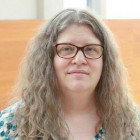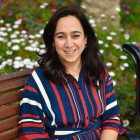Presentation Panel
Upgrade Your Educational Assets! Best Practices to Organise Professional Development for Technology-Enhanced Teaching
Date Friday, Nov 25 Time – Room: Charlottenburg II
With the sudden shift to emergency remote learning during the pandemic, getting teachers up to speed for online delivery has never been so crucial and urgent. In this presentation panel, speakers will discuss novel ways in which higher education institutions can organise faculty support services for their staff. At the end, a discussion among participants could lead to new ideas.

Vesa Paajanen
Senior Lecturer, University of Eastern Finland, Finland
Vesa Paajanen is a senior lecturer in animal physiology. In current position as a facilitator of online and blended learning at University of Eastern Finland he is using 50% of the working load on teaching higher education and rest time helping his colleagues to turn their teaching online and to develop pedagogically useful online learning environments. In higher education his is focused in Flipped Classroom & learning analytics to support each student in a personal way.

Patti Dyjur
Educational Development Consultant, University of Calgary, Canada
Patti Dyjur, PhD, is an Educational Development Consultant with the Taylor Institute for Teaching and Learning, University of Calgary. She works on curriculum review and development, as well as collaborating with others to design courses and programs that incorporate intentional, meaningful student learning experiences. Her research interests include curriculum development and review in higher education, micro-credentialing, and Universal Design for Learning (UDL) in higher education.

Hilde Gaard
Senior Adviser, Directorate for Higher Education and Skills, Norway
Hilde Gaard is an Information technology and Library specialist. She has over 15 years' experience as a project manager and consultant in innovation projects within education. She has held executive positions and have extensive experience from government agencies related to flexible learing models, digital transformation and quality enhancment in higher education. Hilde is currently a senior adviser at the Directorate for Higher Education and Skills, working with incentive programs to promote and enable online and technology-enhanced education.

Hoda Mostafa
Director Center for Learning and Teaching, American University in Cairo, Egypt
Hoda is a Professor of Practice and the Director at the Center for Learning and Teaching, American University in Cairo. She actively leads and serves in the areas of educational development, digital education and strategic educational initiatives that enhance the profile of AUC as a global university.
She collaborates across the university and beyond, as a faculty developer, supporting and enabling innovation in teaching and learning, formative assessment of learning and teaching, digital education, experiential learning, and integration of creative and critical thinking into the curriculum. She also has an MD in Ophthalmology and lengthy experience in clinical practice and medical education.
Hoda joined AUC as a faculty member in 2011 after transitioning into higher education and continues to develop her interest in, and commitment to, faculty development, design thinking, digital education, pedagogy and thinking skills in the classroom and beyond.
She develops and facilitates professional development workshops for faculty and teaching assistants across a variety of topics within the field of educational development. She also consults with faculty and leaders across AUC through her role as director of the CLT, an active educational developer and consultant. Hoda has held leadership positions at the Center for Learning and Teaching since 2016 as Associate Director and Director in 2018.
She has taught extensively in the core curriculum at AUC for over 10 years teaching and developing the course Scientific Thinking and directed this multi-section course initiative from 2011-2015. She has also directed the co-development of the course Creative Thinking and Problem Solving at a freshman level and co-taught Design Thinking as part of this multi-section core offering.
Hoda recently led her team to support the university’s transition to emergency remote teaching during COVID-19 pandemic and is responsible for blended and online learning initiatives. She has contributed extensively and co-led multiple high impact institutional initiatives such as AUC’s Learning Spaces Plan, Hybrid Learning Spaces (dual delivery), the Quality of Education Task Force for Undergraduate and Graduate Education, and Design Thinking Initiative.
She is also a passionate design thinking facilitator and coach with a mission to spread innovation frameworks in higher education curricular and co-curricular activities and spear-heads design thinking activities at AUC.
Moderator

Nives Kreuh
Senior Lecturer, Archimedes Institute, University of Applied Sciences Utrecht
She is currently a teacher trainer, teaching Methodology and Research courses at the Utrecht University of Applied Sciences, Institute Archimedes. She is also the product manager for Methodology and Research courses, a member of the innovation team designing the new programmes and an expert for digital didactics, responsible for curriculum, integrating digital didactics and information literacy in the new programmes for teaching languages. Her focus is digital content and instructional design. Before moving to the Netherlands in 2020 she was leading the national research, strategy planning, and implementation of curricula in the field of digital education, and the use of digital technology in education at the Quality and Research Centre at the National Education Institute in Slovenia.
Links
Designing the Possible Future: The Role of Centres for Learning and Teaching As Enablers, Hoda Mostafa
This presentation will invite participants to rethink the future and re-imagine the possible and preferable future based on their current understanding of an educational and professional development environment that has been heavily influenced by the pandemic as well as global challenges.
Using both the Voros Cone and Systems Thinking as springboards for this session, we will convene around a series of provocations, questions, and challenges to help us better understand the teaching and learning ecosystem within institutions of HE and how this connects with faculty and student needs.
Using this system-thinking approach will help participants to seek to understand the challenges at hand. The premise here is that Centres for Learning and Teaching (CLTs) have evolved quickly to respond to institutional needs and that they have become an important pillar in higher education.
The facilitator will share some of the challenges identified at the American University in Cairo (AUC) and the insights gained through a summer co-design faculty event at the Centre for Learning and Teaching (CLT) which examined the unique AUC teaching and learning space within its own HE ecosystem.
The session will provide examples of how to conduct similar sessions, questions that can spark conversations around the possible future of HE, and frameworks developed by the CLT.
Overview
- Discuss the evolving eco-system of HE with the pull and push of a new paradigm and identify some of the key challenges within your own institutions.
- Understand the key role of Centres for Learning and Teaching as enablers of change within HE and individual institutions.
- Craft a series of questions and think of ways to build “mission questions” that could help replace a “mission statement”.
- Gain access to resources and a tangible process for conducting co-design sessions with faculty, stakeholders, and para-academic staff involved in teaching and learning in HE.
Technology Meets Pedagogy: The Role of Staff Support Services in Norway, Hilde Gaard
This presentation will emphasise the significance of staff support services and staff development for advancing the digital transformation in higher education. The presenter will share the key findings of a recent national survey mapping the status, organisation and role of the teaching and learning centres at Norwegian higher education institutions.
As efforts to digitalise and innovate higher education have intensified over the last few years, the importance of faculty support for technology-enhanced teaching and learning has become more and more apparent. Little is known, however, about the status, organisation and role of teaching and learning centres and other faculty support units in various national contexts, including Norway.
The Norwegian Directorate for Higher Education and Skills, the executive agency of the Norwegian Ministry of Education and Research, is dedicated to the enhancement of quality in higher education and skills and is also a driving force for the digital restructuring of Norwegian higher education institutions.
In 2021, the Directorate carried out a national survey to map, among other things, the organisation and make-up of faculty support units, the types of teaching support services on offer, and the roles these structures play in institutional work on digitalisation and quality enhancement.
In this talk we will present some of the key findings from the survey. We will mainly focus on qualitative data related to lessons learnt from the digitalisation efforts during the last couple of years as seen by the support staff, and their perspectives on important priorities going forward.
Some of the key insights emerging from our data are that all Norwegian universities and colleges now have institutional structures in place to support technology-enhanced teaching and learning. These support services are organised in many various ways, based on institutional needs. Their foci are also different, ranging from mainly pedagogical and didactic support to primarily software support.
At the same time, and with the varied ways in which these support units are organised, there is a general call for more national solutions to technical and didactic issues.
Finally, there is also a need for more research on the teaching staff’s needs for support, and on how support services can work together with other key institutional and national stakeholders to effectively facilitate the digital restructuring of Norwegian higher education.
Overview
- Learn about the diversity of faculty support units in Norway and the context within which they operate.
- Reflect on the various roles support services can play in developing technology-enhanced teaching and learning at higher education institutions.
- Gain insight into how staff support services can contribute to the enhancement of teaching and learning, as well as providing some new ideas for further development of teaching support services at higher education institutions.
When In-person Is Out: A Range of Professional Development Possibilities, Patti Dyjur
In this presentation participants will hear about novel ways of providing professional development, such as online learning modules, and how they were enacted in one Canadian university. They will also consider the benefits and trade-offs of various methods of online professional learning development.
With the sudden shift to emergency remote learning in March 2020, Centres for Teaching and Learning (CTLs) in higher education were forced to quickly adapt to a new way of doing things. Prior to that, many CTLs offered predominantly face-to-face professional learning development (PLD) opportunities.
When that was no longer an option, they had to either cancel their PLD offerings or adapt them to meet the learning needs of the campus community. Never before had the need for PLD been so crucial and urgent: instructors had a range of time-sensitive tasks to complete, such as preparing to teach online, redesigning their assessments for online delivery, and learning to use video conferencing technologies such as Zoom.
In this session we will provide an overview of our CLT’s approach to professional learning development during the early days of the pandemic, including online presentations, video recordings of presentations, resource development, online learning modules, and online consultations.
We will discuss benefits and drawbacks to the decisions made, including factors such as meeting campus community needs, scalability, accessibility, personalization, sustainability, reusability, impact, interaction, robustness, and level of impact. We will conclude the presentation with a question-and-answer period.
Overview
- Identify criteria for selecting the type of online professional learning development.
- Weigh factors such as accessibility, sustainability and scalability when considering online professional development opportunities.
- Select online professional development formats based on given criteria.
Peer-Support for Developing Online Higher Education, Vesa Paajanen
This presentation works as an example of a solution to help faculty design online and blended teaching. Discussion among participants can lead to new ideas for organising teacher support in higher education.
Higher education is at a turning point. Not only due to the COVID-19 pandemic, which forced universities to develop their online platforms and practices, but also prompted by a long tradition of studying online, pursued by students across the borders of departments and universities. Even in institutions that mostly limit teaching to fixed classrooms and lecture hours, students are often able to complete their education partly online.
There is a clear need for more online and blended teaching in higher education.
Since faculty members may have limited skills in digital pedagogy and its applications, investments in teaching technology can easily lead to its low utilisation rate and its adoption by only a few teachers.
That’s why in 2021 the University of Eastern Finland started a two-year project to encourage teachers to use online teaching and learning tools with the help of pedagogical peer-support. The university hired five experienced teachers from different faculties and the language centre to work as facilitators of online and blended learning pedagogy to help their peer-teachers during 50% of their work time.
Since January 2021, they have supported teachers in developing individual courses and helped departments and faculties to organise their teaching. They also became an important link between the teaching staff, the university support services, and the campus renovation planning team.
One of their tasks was to build an online, self-regulated learning platform for teachers in higher education to enhance their practical skills in online teaching and to raise awareness of resources and possibilities of online education. The facilitators also quickly became an easily approachable and fast aid for arranging online teaching – especially for colleagues who engage in blended teaching for the first time.
The facilitators offered practical solutions for online and blended teaching of their peers and operated with the point of view of someone who cares about the educational purpose of the chosen teaching method and about the well-being of both students and teachers.
With their extensive teaching experience and continuous link to practical teaching work, they often could offer more hands-on tricks and warnings of pitfalls than the university support services because they speak the language of university teachers, not that of ICT.
For higher education institutions that want to tap into the expertise and know-how of their teaching staff, it can be very persuasive to allocate time resources into this kind of facilitator project.
Overview
- Learn how peer-support can help teachers in higher education use digital technology.
- Compare the benefits of pedagogical support with high-tech solutions.
- Understand the requirements of organising teacher-based peer-support in universities.